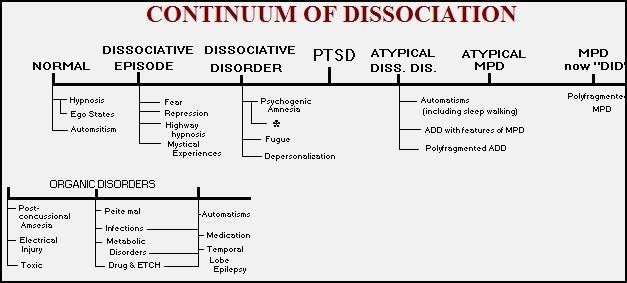|
|
| FAQ/Help |
| Calendar |
| Search |
|
#1
|
||||
|
||||
|
UNDERSTANDING THE DISSOCIATIVE DISORDERS
Dissociative Amnesia A defining characteristic of dissociative, amnesia is the inability to recall important personal information. This common dissociative disorder is regularly encountered in hospital emergency rooms and is usually caused by a single stressful event. Dissociative Fugue Like dissociative amnesia, dissociative, fugue also is characterized by sudden onset resulting from a single severe traumatic event. Unlike dissociative amnesia, however, dissociative fugue may involve the creation of a new, either partial or complete, identity to replace the personal details that are lost in response to the trauma. Depersonalization/Derealization Disorder The distinguishing characteristic of depersonalization disorder is the feeling that one is disconnected or unreal. Mind or body may be perceived as unattached, seen from a distance, existing in a dream, or mechanical. Chronic depersonalization is commonly accompanied by "derealization," the feeling that features of the environment are illusory. It should be noted that depersonalization as an isolated symptom may appear within the context of a wide variety of major psychiatric disorders like schizophrenia, borderline personality disorder, panic disorders and even depression. Mild episodes of depersonalization have been reported following alcohol use, sensory deprivation, mild social or emotional stress or sleep deprivation, and as a side effect to medications. However, severe depersonalization is considered to be present only if the sense of detachment associated with the disorder is recurrent and predominant. Dissociative Identity Disorder Dissociative Identity Disorder (DID) is the most chronic and severe manifestation of dissociation. DID is believed to follow severe trauma including persistent psychological, physical, or sexual abuse. In this disorder, distinct, coherent identities exist within one individual and are able to assume control of the person's behavior and thought. DID is often difficult to detect without the use of specialized interviews and/or tests, due to: 1) the hidden nature of the dissociative symptoms, 2) the coexistence of depression, anxiety, or substance abuse which may mask the dissociative symptoms. 3) it is not uncommon for a decade or more to pass before a correct assessment of DID is made. Dissociative Disorder Not Otherwise Specified Dissociative Disorder Not Otherwise Specified (DDNOS) is an inclusive category for classifying dissociative syndromes that do not meet the full criteria of any of the other dissociative disorders. A person diagnosed with Dissociative Disorder Not Otherwise Specified (DDNOS) typically displays characteristics very similar to some of the previously discussed dissociative disorders, but not severe enough to receive their diagnoses. http://www.strangerinthemirror.com/dissociative.html Our thanks to Petunia who found this information for us.
__________________
I still dream and I still hope, therefore I can take what comes today. Jan is in Lothlorien reading 'neath a mallorn tree. My avatar and signature were created for my use only and may not be copied or used by anyone else. |
ADHD1956, AShadow721, Crew, DancingAlone, FaeryofMadron, hippiebea, Lillyleaf, lynn09, notz, Nupoet64, Rhiannonsmoon, stillhopeful, stove14
|
|
#2
|
||||
|
||||
|
then hubby may fit too hu? oh my he blots out much
|
|
#3
|
|||
|
|||
 . Jan I have a peep from here that is also a phone talker with me . . Jan I have a peep from here that is also a phone talker with me .In the past couple days they have confuzzled me . .I had noticed a possible disassociative behavior ,,, But thought more AADD >> caffiene helped them to chill like . Now I Spose through trust I am encountering alts as to extent .....but knows of no trig thing ,, PTSD ? Trauma.  . .
|
|
#4
|
|||
|
|||
|
I just came across this powerpoint presentation:
http://facultyfp.salisbury.edu/iewhi...s/chapt06b.ppt Might be something for the newly diagnosed to view or the one wondering about dissociative disorders. |
AShadow721, Miracle1986
|
|
#5
|
||||
|
||||
|
I guess I still dont understand what DID really means.
__________________
Do not stand at my grave and weep; I am not there. I do not sleep. I am a thousand winds that blow. I am the diamond glints on snow. I am the sunlight on ripened grain. I am the gentle autumn's rain. When you awaken in the morning's hush, I am the swift uplifting rush of quiet birds in circled flight. I am the soft stars that shine at night. Do not stand at my grave and cry; I am not there, I did not die. R.I.P. Bandit 7-12-08 I love you I miss you. |
|
#6
|
|||
|
|||
|
I am new here and I have the gift of MPD they kept me alive and still are I guess
 Hugs Pam |
|
#7
|
||||
|
||||
|
been hearing rumours the DSM crew bes thinksy about making a new Dx called something like "dissociative trance disorder". Basically a way to create a psychobabble label for the condition of being inhabited. Hah, good luck with that.
__________________
~ Moriah Conquering Wind ~ +++++++++++++++++++++++++++++++++++++++++++++++++++++++++++++++++++++++++++++++++++++++++++++++++++ begin transmission 11.30.64 heh.finale (02) -111 11.22.63 jpl 156 435 666/93 abaddon temple annihilation bridge rev10 priestess 98 world-soul choronzon reversal babalon fallen forfeiture 01. unfinished sequence. system compromised. code gray. retrieval and cycling initiated 11.28.08, 74 >> 75 end transmission +++++++++++++++++++++++++++++++++++++++++++++++++++++++++++++++++++++++++++++++++++++++++++++++++++ >> postcards from the abyss << |
|
#8
|
||||
|
||||
|
wouldn't being inhabited seem to fall under the diagnosis of DID or schizophrenia or something like that? (if i am getting your meaning of "inhabitation" right)
__________________
花鳥風月
c'est tout ce que j'aime |
|
#9
|
|||
|
|||
|
It took a few years to understand, and I still have a hard time believing it sometimes. But I was just recently diganosed with DID.
It's very difficult for me to have friends or relationships or even be around people because of how strange and "crazy" I seem. I only have 2 good friends. I like this community being here for me, it makes me happy.  I need to find a therapist who can help "fix" the "problem" of DID. I need to find a therapist who can help "fix" the "problem" of DID.I'm afraid to, because my alters are the only thing that hold me together as a human and my soul and my mind... if that makes any sense. I'm terrified to not have them anymore... They're scared too and I'm afraid they will interfere with the therapist. They've done it several times. Any suggestions?
__________________
"Got dirt, got air, got water, and I know you can carry on." ~Modest Mouse This is the Breakfast Club!!! |
|
#10
|
|||
|
|||
|
thanks for the info
|
|
#11
|
||||
|
||||
|
The poem is beautiful... The person sounds free ... It would be nice to feel that free in this life instead of waiting for death which is still left a little to conjecture in my mind. But clearly this person is bothered by others mulling over his death.
|
|
#12
|
|||
|
|||
|
Quote:
i AM NEW TO THIS CHAT FORUM AND I REALLY IDENTIFY WITH WHAT YOU ARE GOING THROUGH. If anyone has any suggestions, please let me know |
|
#13
|
|||
|
|||
|
The Silver Boat by Ann Adams will help settle your alters down if you're at the point of becoming "one."
The Silver Boat is a magical, beautifully illustrated fairy tale that will delight children of all ages. It describes the journey that all of us must take in order to leave our pain behind and reach the healing place of "the warm and sunny land". Much like Dorothy in The Wizard of Oz, this tale of empowerment teaches the lesson that the power lies within the "little girl" herself to overcome her fears, conquer the dragon, and achieve her dreams. This therapeutic metaphor, originally published in 1990, has both delighted and comforted thousands of people struggling with fears or the aftermath of abuse and trauma. Many therapists have creatively incorporated the story into individual or group sessions. http://www.sidran.org/store/index.cf...&Product_ID=31 |
|
#14
|
||||
|
||||
|
Quote:
|
|
#15
|
|||
|
|||
|
Quote:
How well spoken and I totally agree. Pugnose and her peeps |
|
#16
|
||||
|
||||
|
I am so glad I got your information you dont know how much it has freed me and opened up whole new avenues I have freed myself from years of quilt..and now have knew directions..Thank You So Much :grouphug:
|
|
#17
|
||||
|
||||
|
welcome ozark loves. sometimes just reading about our "illness" can be very freeing. i hope that you will feel safe here with us, and will be able to understand the things you have done to keep yourself safe all these years...our thoughts are with you today as you revel in that freedom of the new directions it has given you...crys
__________________
True love exists when we lose ourselves to invest in the care of others. |
|
#18
|
|||
|
|||
|
Hi everyone,
I've noticed more people seem to be interested in dissociation lately and I know how confusing it can be. I found these two articles to be helpful explaining the continuum and I hope they help people understand the difference between normal, everyday dissociation and the Dissociative Disorders.  What is Dissociation? In general, dissociation is a defense mechanism that everyone uses every day. In its most common form, mild dissociation includes day dreaming, "zoning out," or doing things on "autopilot." For example, when you find yourself staring out the window thinking about what you are going to do after your class, driving a car and not recalling the details of how you got from one point to the next, or getting so caught up in a movie you don't hear someone whispering behind you - these are all examples of normal dissociation. Dissociation is a form of self-hypnosis. Everyone experiences dissociation. You may dissociate more when you are tired or bored. Think about times when you have been in a boring meeting or a class with a teacher who talks with a monotone voice and doesn't use ways to engage your interest. What do you do? Maybe you start to doodle, you day dream about something that is more interesting or you think about a problem that is on your mind. Dissociation gives you an ability to do more than one thing at a time. While you may be half hearing what is happening in the boring class or meeting, your mind is wandering off somewhere else. Dissociation is a wonderful aspect of creativity and imagination. Think about the times when you were able to be the most creative. Sometimes creative folks need to enter into the "twilight zone" of dissociative states to really get their imagination going. Therapy is often best done in dissociative type states. When working with teens, I often encourage them to use a distraction while dealing with difficult issues to help them examine their feelings. It can be very helpful! In fact, the sandtray work I do encourages people to enter into a dissociated state in order to work through conflicts and difficult feelings that may not otherwise come out in therapy. As a therapist, I encourage healthy dissociation. Everyday Dissociation we all experience that is healthy in general: day dreaming, spacing out, fantasy, highway hypnosis etc. Some people can read a book or watch a movie and become totally unaware of their surroundings. If a person calls your name you might not hear them until they begin to raise their voice. That is a signal that you have dissociated or spaced out. Other people find themselves reading or watching TV and find that they haven’t understood anything in the last five or ten minutes or haven’t got a clue what the last paragraph said even though they have read it three times. You have just dissociated. http://therapist4me.com/Dissociation.htm ---------------------------------------- What are Dissociative Disorders? Depersonalization Disorder - a feeling that your body is unreal, changing or dissolving. Strong feelings that you are detached from your body. Dissociative Amnesia - not being able to remember important personal information or incidents and experiences that happened at a particular time, which can't be explained by ordinary forgetfulness. Dissociative Fugue - there is severe amnesia, with moderate to severe identity confusion and often identity alteration. For instance, a person travels to a new location during a temporary loss of identity. He or she may assume a different identity and a new life. Post-traumatic Stress Disorder (PTSD) - this person may experience flashbacks, reliving the trauma repeatedly, which causes extreme distress. This, in turn, triggers a dissociative, numbing reaction. Dissociative Disorder Not Otherwise Specified (DDNOS) - different types of dissociation may occur, but the pattern of mix and severity does not fit any specific dissociative disorder. Dissociative Identity Disorder (DID) - sometimes called Multi-Personality Disorder (MPD). Someone with DID experiences shifts of identity as separate personalities. Each identity may assume control of behavior and thoughts at different times. Each has a distinctive pattern of thinking and relating to the world. Severe amnesia means that one identity may have no awareness of what happens when another identity is in control. Dissociation was used by many of us to deal with the abuse as children and adults. In situations of trauma dissociation is an automatic process. It protected us as children or victims in situations where we could not run or fight. For many of us it saved our sanity. Faced with overwhelming abuse and their inability to flee or fight to protect themselves, it is not surprising that children would psychologically flee (dissociate) from full awareness of their experience. Understanding dissociation and its relationship to trauma is basic to understanding Post-Traumatic Stress Disorder and Dissociative disorders. Dissociation is the disconnection from full awareness of self, time, and/or external circumstances. All of the disorders are trauma-based, and symptoms result from the dissociation of traumatic memories. Dissociation, Abuse Recovery Page - Lee Marsh |
4Grace, ADHD1956, Anonymous273, Anonymous39281, biiv, BlueMoon6, Christina86, Crew, DianasClan, fallenangel337, hummingirl, krazy_phoenix, kris9999, lorna, Miracle1986, MissCharlotte, mlpHolmes, multipixie9, notz, pegasus, phoenix7, Pomegranate, possum220, Rain76, Rapunzel, reddevil, Saphael, shezbut, SICKlySweet, Spaflower, StephanieDV, turquoisesea, Ubiquitous Maninlev, wanttoheal, white_iris, Zorah, Ztrauq
|
|
#19
|
||||
|
||||
|
just wanted to say, thanks for the posting... very clearly explains a lot, kinda want it stickied or something, because I was looknig for this kind of information when i first started experiencing some stuff and I wasn't sure what it was...
thanks again 
__________________
 Yesterday I was so clever, so I want to change the world. Today I am wise, so I am changing myself. |
|
#20
|
|||
|
|||
|
This is great information, thanks Orange!
     
__________________

|
|
#21
|
|||
|
|||
|
Glad everyone found it helpful.

|
multipixie9, Zorah
|
|
#22
|
||||
|
||||
|
((((((((((Orange_Blossom))))))))))
theres one thing i noticed that wasnt talked about...people wif borderline personality disorder do sometimes dissociate...i donno ta what degree or nething...but i know that in times of stress my friend who is bpd will dissociate an not remembr what happened...so i donno where that fits inta the lineup...  abbi of Jewels
__________________
True love exists when we lose ourselves to invest in the care of others. |
|
#23
|
|||
|
|||
 I do believe that would fall under "Dissociative Episode" but don't hold me to it. 
|
|
#24
|
||||
|
||||
|
Quote:

__________________
 Pegasus Got a quick question related to mental health or a treatment? Ask it here General Q&A Forum “Everybody is a genius. But if you judge a fish by it's ability to climb a tree, it will live it's whole life believing that it is stupid.” - Albert Einstein |
Can't Remember, multipixie9
|
|
#25
|
||||
|
||||
|
Thank you, until lately I didn't know there was a name for this. Just something I do sometimes and can't control. Thank you for clarifying.
__________________
Its raining on cloud nine. 
|
BlueMoon6
|
| Reply |
|
|
 Similar Threads
Similar Threads
|
||||
| Thread | Forum | |||
| Treatment of dissociative disorders with medication | Psychiatric Medications | |||
| Dissociative Disorders Support Chat | Other Mental Health Discussion | |||
| Relaxation & Dissociative Disorders | Dissociative Disorders | |||
| Dissociative disorders vs. Did | Dissociative Disorders | |||